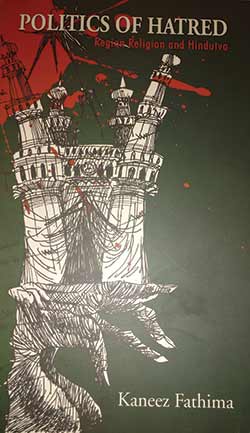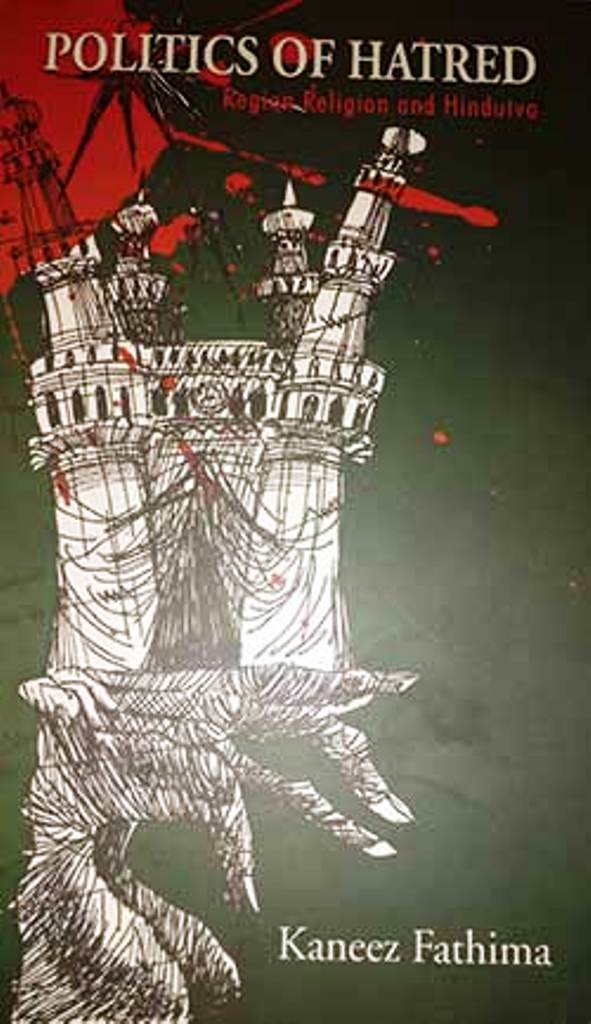Review of The Politics of Hatred: Region, Religion and Hindutva (2014, Hyderabad: Indus Publications) by Kaneez Fathima
By Z. Fareen Parvez
Politics of Hatred is a collection of essays written by Kaneez Fathima, a longtime and dedicated activist for civil and human rights focusing on Muslim minorities. The essays were written between 2009 and 2013 and span a number of important issues related to the plight of Muslims, from the Telangana movement to madrasa education. The author weaves them all together by analyzing how Hindutva campaigns and organizations politicized and attacked marginalized Muslim communities. Although the author focuses squarely on Hindutva, she is careful to point out that “it is only a section of upper caste Hindutva people who want to spread hatred….” (12).
The book begins with a foreword by Ram Puniyani of Mumbai’s All India Secular Forum that carefully connects the essays to the larger context of Indian political history and the manipulation of religious minorities. The author then provides a brief but incisive summary of how colonialism gave birth to communalism as well as how the forced takeover of Hyderabad state by the newly independent Indian state led to tragic consequences. Here, as in many other places in the book, the author bravely critiques the dominant historical account. Hyderabad’s annexation was not through “police action,” she asserts, but rather, genocidal violence (14). In the decades following Hyderabad’s annexation, Muslim suffered attacks on their cultural and religious legacies, language, and history.

One of the major themes of the essays is how Hindutva forces intervened in various issues to communalize the debates and in doing so, created tensions between Muslim and Dalit communities. This is unfortunate because, as the author notes, Muslims themselves suffer “indirect untouchability” (14) and there is great need for coalitions between Muslims and Dalits (72). Yet Hindutva successfully pitted these groups against each other in the contentious debates over reservations as well as Telangana statehood. In one essay, the author defends reservations for Muslims, offering an insightful analysis inspired by Dr. Ambedkar. She argues that the Indian constitution effectively guaranteed equal rights; and to deny the right to reservations is to misunderstand the spirit of the Constitution. Several other essays examine the struggle for Telangana, where again the BJP and RSS interfered and tried to communalize the struggle. This was especially damaging, given that Telangana was really about the people’s struggle, as the author writes—against a class of (coastal Andhra) brokers who took possession of the region’s water, land, and wealth. Other issues addressed in the book include the illegally constructed Bhagyalakshmi Temple at the base of the Charminar monument in Hyderabad and Hindutva attacks against MIM (Majlis-e-IttehadulMuslimeen) MLA, Akbaruddin Owaisi.
Other highlights in the book, among others, are a discussion of the Makkah Masjid blasts in 2007 and the various injustices against Muslims that took place in this episode and an essay on the situation of Muslim women. The author presents the unique ways in which Muslim women are oppressed as a result of police violence against their family members. They suffer psychological trauma in the aftermath of police raids, stigma when their neighbors disassociate from them, and economic consequences when their breadwinner husbands and sons are arrested and detained. The author makes the important point that most literature on Muslim women has ignored these issues, instead focusing on religion.
Overall, this is an excellent set of essays that provides an overview of the barriers that Hindutva factions have erected against Muslims, in Hyderabad especially, in the last decade. One of the strengths of the book is the author’s in-depth experience as an activist with the Civil Liberties Monitoring Committee. Her research and years of public engagement inform the passionate arguments in these essays. And it is a pleasure to read numerous poetic passages in the book such as: “Let us unite and struggle for Telangana movement and move forward shoulder to shoulder” (43). Anyone interested in a deeper understanding of civil liberties and minority rights in Hyderabad will have much to learn from these essays.
(Author Z. Fareen Parvez is Assistant Professor of Sociology, University of Massachusetts-Amherst, USA.)


